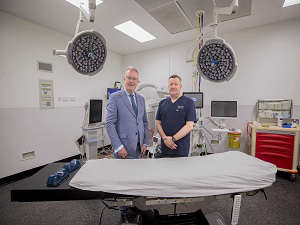
By Adam Evans
Expert advice to delay the introduction of the Renewable Heat Incentive in Northern Ireland was not followed due to Arlene Foster's desire to push ahead with the scheme, an inquiry has heard.
Ofgem, which administered the botched RHI scheme in the region, claims officials in the Department of Trade and Investment (DETI) stated the position of Mrs Foster, then DETI minister, in a teleconference in 2012.
The RHI was launched in Northern Ireland that year. Its fatal flaw was that, unlike the GB version of the state-subsidy scheme, it did not have key cost controls.
The lack of cap on tariffs paid to incentivise the use of eco-friendly boilers enabled applicants to effectively burn to earn, making a profit from heating their properties.
The RHI left the Stormont administration facing a potential £700 million overspend bill.
The GB scheme had been up and running for a period before the Northern Ireland version went live at the end of 2012.
Ofgem, which worked on both schemes, recommended that the Northern Ireland model should not be introduced until the impact of a tightening of cost controls in the Great Britain scheme became clear.
Counsel for the inquiry, David Scoffield QC told the second day of the public inquiry: "Ofgem personnel advised DETI to wait until the GB regulations were amended, as those amendments would negate risks which the draft Northern Ireland regulations currently posed.
"Ofgem evidence is that the department recorded the minister's wish to proceed without waiting or having reviewed the amendments to the GB RHI scheme."
Mr Scoffield said the inquiry would have to consider whether Ofgem's recollection of the exchanges with DETI were accurate.
"Assuming they are accurate, the inquiry will also want to consider what basis there was for the minister or the suggestion that the minister was adamant that the scheme must go live in October (2012)," he said.
The inquiry at Parliament Buildings, Stormont, also heard that consultants who admitted not spotting the fatal flaw in the botched green energy scheme have moved to minimise their share of the blame.
Cambridge Economic Policy Associates (CEPA), which advised on the RHI, expressed regret to a Stormont watchdog last year for not realising the subsidy paid to the owners of renewable heat boilers was actually higher than the cost of fuel.
CEPA were paid almost £70,000 to mathematically model the RHI during its development stages in DETI in 2011/12.
In evidence to Stormont's Public Accounts Committee last November, Mark Cockburn, a director at CEPA, said the organisation should have spotted the need to taper off subsidy pay-outs with some form of tiering.
"We missed it," he said.
The economist added: "The need for tiering was not identified within the 2012 report and we have accepted that."
However, the public inquiry into the "ash for cash" RHI affair heard that CEPA had provided fresh written evidence that changed the position stated by Mr Cockburn.
Mr Scoffield said: "I think it is fair to say that CEPA's written evidence to the inquiry represents something of a considerable retreat from what Mr Cockburn said to the Public Accounts Committee."
CEPA still acknowledge its consultants ideally should have spotted the need for tiering, but it states that it assumed too much blame for the error in its evidence to the PAC.
It highlighted that it was only asked to carry out "limited" work for DETI; that it was not specifically asked to examine the issue of tiering; and it contended that DETI was a "highly informed client" that should have spotted the tariff problem itself.
Mr Scoffield said its written evidence made the point that "in terms of overall responsibility, at the end of the day this was DETI's scheme, not CEPA's".
The lawyer then read out a key section of the statement: "Whilst we are previously on record as saying that we should have spotted this, reflecting the high standards that we would normally set ourselves, a more detailed consideration of the context and detailed review of the evidence, together with a more forensic review of our contractual responsibilities, causes us to reconsider our position as regards this.
"In short, while we recognise we missed the opportunity to do so, on reflection we went too far in terms of assuming responsibility, especially given the internal expertise that DETI had and given what we were contracted to do."
Last year Mr Cockburn told the PAC the requirement for tiering the tariff rate was deemed not necessary in its first report to DETI in 2011.
However, he said when CEPA was asked by DETI to look again at elements of the scheme six months later, in response to a public consultation, circumstances had changed and a requirement for tiering should have been identified.
During the same hearing, Mr Cockburn conceded the lack of tiering was a factor, but he said the main reason for the overspend was Stormont's inability to close down the RHI quickly when problems emerged, and a failure to regularly review the tariff level.
He highlighted that CEPA made a recommendation to DETI to keep a close watch on the operation of the scheme.


 Mother and two children murdered in Maguiresbridge to be buried together By Jonathan McCambridge and Rebecca Black, PA
Mother and two children murdered in Maguiresbridge to be buried together By Jonathan McCambridge and Rebecca Black, PA
 Surgeon tasked with tackling waiting lists says they are a ‘national shame’
Surgeon tasked with tackling waiting lists says they are a ‘national shame’
 First Minister disappointed to not attend Belfast Pride this year
First Minister disappointed to not attend Belfast Pride this year
 Crowds expected at vigil for mother and children killed in Co Fermanagh shooting
Crowds expected at vigil for mother and children killed in Co Fermanagh shooting